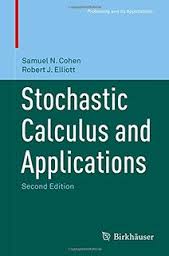
Alan Bain – Stochastic Calculus
Price: $25
Please contact us: – Email: Tradersoffer@gmail -Skype: [email protected]
The following notes aim to provide a very informal introduction to Stochastic Calculus, and especially to the Itˆo integral and some of its applications. They owe a great deal to Dan Crisan’s Stochastic Calculus and Applications lectures of 1998; and also much to various books especially those of L. C. G. Rogers and D. Williams, and Dellacherie and Meyer’s multi volume series ‘Probabilities et Potentiel’. They have also benefited from insights gained by attending lectures given by T. Kurtz. The present notes grew out of a set of typed notes which I produced when revising for the Cambridge, Part III course; combining the printed notes and my own handwritten notes into a consistent text. I’ve subsequently expanded them inserting some extra proofs from a great variety of sources. The notes principally concentrate on the parts of the course which I found hard; thus there is often little or no comment on more standard matters; as a secondary goal they aim to present the results in a form which can be readily extended Due to their evolution, they have taken a very informal style; in some ways I hope this may make them easier to read. The addition of coverage of discontinuous processes was motivated by my interest in the subject, and much insight gained from reading the excellent book of J. Jacod and A. N. Shiryaev. The goal of the notes in their current form is to present a fairly clear approach to the Itˆo integral with respect to continuous semimartingales but without any attempt at maximal detail. The various alternative approaches to this subject which can be found in books tend to divide into those presenting the integral directed entirely at Brownian Motion, and those who wish to prove results in complete generality for a semimartingale. Here at all points clarity has hopefully been the main goal here, rather than completeness; although secretly the approach aims to be readily extended to the discontinuous theory. I make no apology for proofs which spell out every minute detail, since on a first look at the subject the purpose of some of the steps in a proof often seems elusive. I’d especially like to convince the reader that the Itˆo integral isn’t that much harder in concept than the Lebesgue Integral with which we are all familiar. The motivating principle is to try and explain every detail, no matter how trivial it may seem once the subject has been understood! Passages enclosed in boxes are intended to be viewed as digressions from the main text; usually describing an alternative approach, or giving an informal description of what is going on – feel free to skip these sections if you find them unhelpful. In revising these notes I have resisted the temptation to alter the original structure of the development of the Itˆo integral (although I have corrected unintentional mistakes), since I suspect the more concise proofs which I would favour today would not be helpful on a first approach to the subject. These notes contain errors with probability one. I always welcome people telling me about the errors because then I can fix them! I can be readily contacted by email as
[email protected]. Also suggestions for improvements or other additions are welcome.
Alan Bain

